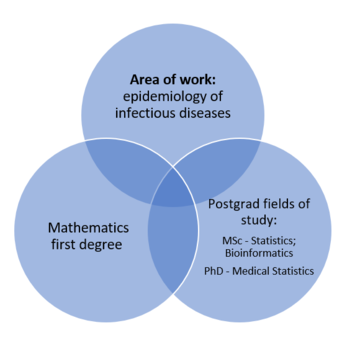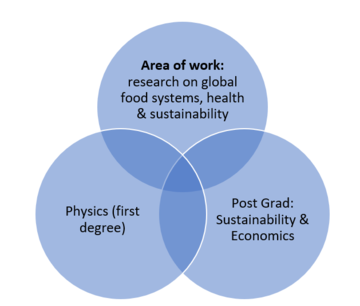These steps were used by the interns to identify people whose research links into many areas of related work.
Initial Research
- Start with departmental websites to identify areas of interest, with the aim of identifying those where researchers work in a collaborative manner across disciplines (a range of social and health areas).
- If you have a social science background, you might start with:
https://www.oxfordmartin.ox.ac.uk/; https://www.politics.ox.ac.uk/; https://www.spi.ox.ac.uk/home.html; https://www.anthro.ox.ac.uk/home - If you have a bio or medical science background, you might start with: https://www.ndm.ox.ac.uk; https://www.tropicalmedicine.ox.ac.uk; https://www.ndph.ox.ac.uk; https://www.psy.ox.ac.uk; https://www.wrh.ox.ac.uk; https://www.ndcn.ox.ac.uk; https://www.medsci.ox.ac.uk
- If you have a social science background, you might start with:
- Browse through the news page on the departmental website to find areas that interest you. If there are no obvious related headlines, begin typing key terms into the website’s search bar.
- E.g. typing ‘health’ into the School of Anthropology’s website yields 230 results on various topics.
- If you have specific interests, tailor your search by typing terms such as ‘maternal health’ or ‘malnutrition’.
- Once you have identified some interesting articles or events, these tend to signal projects currently underway at Oxford university, often in collaboration with partner organisations that intersect the worlds of policy, services and business.
Identifying Contacts
- Locate senior researchers on these projects – as listed within the article – and find their departmental pages which will tell you about their backgrounds and experiences.
- LinkedIn can be very useful here: the senior researchers may also be involved in projects beyond those listed on their departmental page, alongside their work for the university.
- When looking at profiles, try not to become overwhelmed! Senior researchers are often involved in many large-scale impressive collaborations, meaning their profiles can feel quite daunting…
- To find profiles of those at an earlier stage in their careers in the same area, look on the senior researcher profiles for lists of previous and current students or research colleagues (e.g. postdocs, research assistants).
- This isn’t always easy because some researchers do not include this information on their departmental page, especially if they lead a large research group which takes on many doctoral students.
- Many previous students will now be working as post-doc researchers in similar fields at other universities or organisations operating in governance, business or the third sector (e.g. NGOs).
- Identifying PhD students currently working with the lead researcher can shed light on what people in that field do to develop their career in its early stages.
Reaching Out to People
- To find out more, you may wish to contact these early career researchers via email, LinkedIn or Twitter.
- To maximise your chance of a reply, look at the individual’s profiles on all social media platforms to see where they are most active.
- Whilst the 300-character limit of the ‘cold’ contact request message system on LinkedIn can be off-putting, it is an easy way to connect with people in the field. Try writing a message that includes a hook to explain why you’re interested in speaking to them and that you are aware of the work they are doing in the field. For an example of a LinkedIn contact message, see the template below.
“Hi [Name], I would love to connect to be able to ask you some questions about your career and present role. I’m currently interning/working/studying at [place], where I am [outline your interest].”
- If possible, mention some mutual connections you may have, and be complimentary about their work!
Thinking Laterally
- Another route in is to identify organisations with whom researchers have worked as project partners. These tend to have stronger links to policy and governance than the individual themselves; and demonstrate the range of roles available at the intersection between social science, health science, policy and practice.
- Some organisations may even have graduate schemes for those not wishing to pursue further study; see the resource list below for where to start.
- Whether you have a social or health science background and wish to work in policy or service provision, it is worth exploring roles in these organisations related to communication, investment and public engagement.
- Your studies will have given you a strong set of transferable key skills you can apply in roles outside research.
- Once you are working in an organisation, opportunities for progression into other roles arise, both within that organisation and in related ones.
For useful tips, read our briefing on Networking.
What could your future involve?
The interns who led this research found the following projects that have grown from Oxford interdisciplinary collaborations and generated a range of previously un-anticipated working roles. Read the following case studies to learn about how they found them, and what they discovered.










